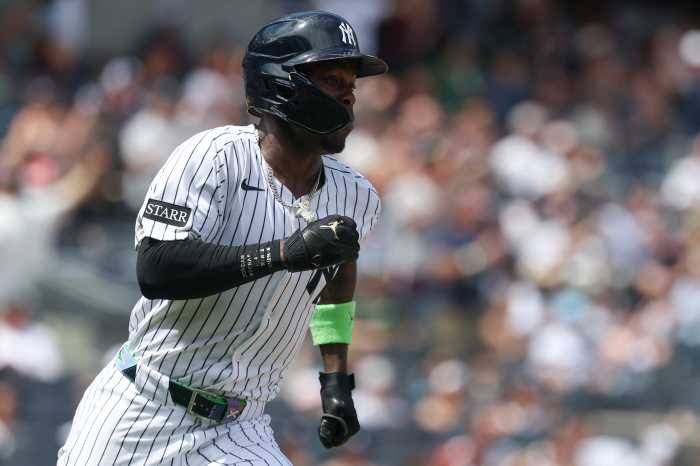Thank CrossFit.
As the strength-training program has grown in popularity, so has Olympic weightlifting — where men and women test their strength by lifting impressive poundage. Competitions like this weekend’s third annual Brooklyn Barbell Club Open routinely sell out, drawing more than 100 athletes in a variety of weight classes.
To find out what it takes to be a competitive Olympic weightlifter, amNewYork caught up with Sarah Revenig, 26, who trains at Brooklyn Barbell Club and is currently working toward qualifying for the 2017 American Open, to talk about the sport.
Why do you do Olympic weightlifting?
On the platform, I feel a freedom I don’t find anywhere else. It is the truest expression of self I have. I can feel invincible, humbled, challenged and powerful all within the same training session.
What is your training regimen like?
I currently train five days a week, between 11⁄2 -2 hours per training session. It involves an hour or more spent purely on the classic lifts: the snatch, and clean and jerk. After that, I am squatting, jumping or working on building explosive movements. On Saturdays — my favorite day of training — I lift with my team, Brooklyn Barbell Club.
What is your diet like?
Macros, macros, macros. Depending on the training day, if I have more work than usual or if I am lifting weights at a higher percentage, I alter the amounts of carbs and fats I intake each day. Protein always remains the same in my diet, no matter the training regimen. When I have time, I like to make egg whites, toast and peanut butter for breakfast. I will make a protein shake to take with me. Throughout the day, I eat lean protein, like chicken, fish or turkey, balanced with green vegetables and a carb. I love rice, so whenever I can have extra carbs in my diet, I like to have rice.
Do you have a workout snack?
During my workout I drink Gatorade and BCAAs [Branched Chain Amino Acids, which promote muscle growth and prevent fatigue]. This helps to keep me hydrated and energized. Right after my workout, I always have a protein shake. I especially like ProMix. My favorite meal after training is something with chicken, rice and veggies. As the day goes on, I stick mostly to protein and fat: more chicken, avocados oatmeal and fruits.
Do you have a nighttime ritual?
At the end of the day, I try to have one last protein shake before I go to bed. The last thing that is part of my every-day is dark chocolate. I always have a bar in the house.
How many calories do you typically consume in a day?
I concern myself less with calorie intake and more with maintaining my macros. I know my body pretty well, and I know when I have not consumed enough fuel for the day. I feel it in my training and when I’m working with clients.
Is there anything you don’t eat?
Certain kinds of dairy, like milk, yogurt and cheese, because they are all inflammatory foods. I don’t cut out all dairy. I still have cream in my coffee, and I still eat butter from grass-fed cows.
What’s your cheat day like?
I love Indian food. I think I could eat that every weekend as my cheat meal.
What are your competition rituals?
There’s always a weigh-in two hours before your session starts. I wake up early, grab a coffee, grab my cooler and head to the meet. I won’t eat or drink anything before my weigh-in. As soon as I’ve made weight, I usually eat between three to five peanut butter and jelly sandwiches. I’ll have Pedialyte to rehydrate, and then I lay down. It’s something I’ve done since my first meet. It’s the only time I ever eat that many PBJs. Waiting for my turn on the platform, I always have my headphones in, blasting music. Before I walk up to the bar, I always try to take a deep breath and smile.
What happens during a competition?
You have three attempts at each lift: three attempts at your heaviest snatch, and then three attempts at your heaviest clean and jerk. The heaviest of each lift are then added together to make your total, which is how you score against others in your weight class.
What’s the heaviest weight you have lifted?
In competition, I have snatched 63 kg [about 139 pounds] and clean and jerked 78 kg [about 172 pounds].
What’s it like being a woman in the sport?
We have some incredible female competitors in this country who have cultivated an atmosphere of respect and empowerment in the sport. There is an overwhelming sense of camaraderie. The community is still very small, so many of us know each other, possibly train together and typically compete locally in the same meets.
Weightlifting in NYC
Olympic weightlifter Sarah Revenig shares her go-to spots that prepare her for her sport.
For training: Brooklyn Barbell Club in Williamsburg, exclusively. “My training demands a lot from me, and I am extremely dedicated to my goals and my program. This means I can’t deviate from what I’m doing, so I don’t participate in any other kinds of studio workouts.”
For gear: “I am a huge Nike fan, so almost all of my pants come from Nike. For sports bras, Lululemon has the best-fitting bra. Most of my shirts are from other gyms that I’ve visited, from weightlifting brands like Hookgrip and Eleiko, and also from GapFit.”





































